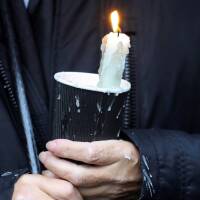West African Countries on Alert for Child Labor Spike Due to Coronavirus
This story was originally published April 30, 2020 by the Thomson Reuters Foundation.
Ivory Coast and Ghana should be on alert for a spike in child labor due to the coronavirus, experts said, with schools closed and monitors unable to access villages in cocoa harvest season.
The two West African countries together produce about 65% of the world's cocoa and child labor has been a longstanding problem in the sector, despite pledges from chocolate companies including Nestle and Hershey to reduce it.

Fairtrade Africa said it had received reports of possible cases in Ivory Coast's eastern and western regions in recent weeks and flagged them to the government.
Government spokesmen for Ivory Coast and Ghana could not immediately be reached for comment.
"In normal circumstances children are already vulnerable, and now they are not going to school," said Anne-Marie Yao, regional cocoa manager for Fairtrade Africa.
More on the impact of COVID-19 around the world
"We don't have access to those villages, we don't know exactly what is happening, and we know that this is the mid-season harvesting period," she told the Thomson Reuters Foundation.
They do not have staff on the ground because of the pandemic, and the shelters where rescued children are normally taken have closed, she added.
More than two million children work in the cocoa sector in Ghana and Ivory Coast, an increase from 10 years ago, according to a draft of a U.S. government-sponsored report seen by Reuters this month.
Some children work for their parents while others are trafficked from abroad, according to activists.
"We have not yet seen any evidence that child labor has increased, but it is still early," said Nick Weatherill, executive director of the International Cocoa Initiative, a Swiss-based foundation working to eliminate child labor.
"If the current situation continues an increase in child labor is very likely," he added.
Early action such as cash transfers to households could help, Weatherill said, since economic losses due to the pandemic will also be a risk factor forcing children to work.
Teachers are often the first to spot child abuse, said Yao, who suggested the state could instruct them to somehow keep in touch with their students and not all leave the communities.
Ivory Coast's national anti-trafficking committee released a statement last week reminding parents that child labor is punishable by law.
"The harvest season and the closing of schools must not be an excuse for violating children's rights," said Ivory Coast's first lady Dominique Ouattara, who heads the committee.
Reporting by Nellie Peyton, Editing by Claire Cozens.





